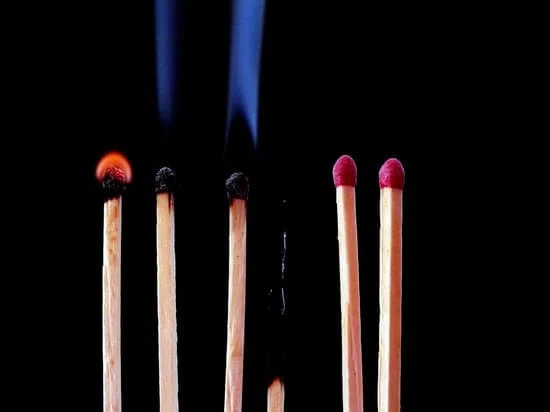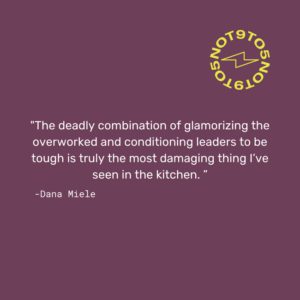Writer: Dana Miele
Can You Avoid Burnout? I Didn’t.
My decision to cook for a living meant stepping away from my dream of being a journalist. I was already on the road to becoming a war correspondent and had interviewed with people at the White House before I even graduated. I wanted to make an impact, but I quickly lost hope when I realized how heavily advertisement rules the narrative. While I recognized the weight that a career in journalism holds, I wasn’t passionate about the type of work I had to do to actually ‘make it’ in the field.
I became a cook to make a positive difference in the lives of those around me and hoped that in turn, they would do the same to the people around them. I needed a ‘why’ to my work, and I found in cooking what I struggled to find in journalism. Since then, I have always felt connected to the importance of hospitality in our society. It is extremely challenging, and there are many hard days, but I have never lost touch with my ‘why.’
Differing opinions have often been a point of contention with my kitchen co-workers. I try to lean into things that are productive to the common goal. Although many disagree, I reject the comparisons of the military to the kitchen because I have loved people who have served and it feels disingenuous. The struggle between not taking yourself seriously but seriously enough to commit 70 hours a week to hospitality is a complex one.
Learning a new skill isn’t easy. This is especially true when you work in kitchens because often you’ll be humiliated by people you idolize if you’re bad at something. Practicing to become a professional chef isn’t something you can do in the privacy of your own home. To me it was clear, you have to learn on the job. If you don’t embrace the embarrassment that comes with making mistakes while you learn in the short term, then you will have to accept the humiliation of being bad at what you do in the long term.
As a result, a lot of people remain stagnant out of fear. In the past, I had a judgment toward cooks I used to work with who didn’t challenge themselves harder. I realize how that came from my own insecurities, fueled by the chefs I admired at the time.
As I worked in better places, I realized that some chefs actually don’t talk shit about others and choose to focus their energy on the work to be done instead. After about the fifth restaurant I worked in, I finally felt confident in my skills and knowing my way around a kitchen. Unexpectedly, my judgment and jealousy of other people evaporated and I haven’t felt it since. If you are like me and resent these negative qualities in yourself, I would suggest keeping your head down and focusing on your skillset. People who trust their own competence rarely feel jealousy. It’s an earned part of my character I plan to never let go.
Once I was at peace with myself and my skill set, I never thought twice to question the hours. I told myself that this is what all this hard work was for. You put in the hours, make the sacrifice and reap the reward. I now have a steady mind with a resume you’d want to frame on the wall.
Yet unfortunately, by the time you reach your goal after tirelessly trying to prove yourself, you don’t have the energy to care about being impressive. The reality is that a lot of the people you want to acknowledge your accomplishments no longer impress you, and the people close to you are rightfully concerned that you will drive into an embankment at 3 AM because you dozed off at the wheel.
I cringe thinking about the importance that my younger self put on the title ‘Chef.’ At this point in my career, hell, if my Pops throws a steak on the BBQ he is chef Tony for all I care.
Burnout can happen in any industry, but what is specific to ours is that you are deemed unworthy and weak if you can’t ‘suck it up and check it at the door.’ I recognize leaders are expected to be stoic and are considered undesirable if they aren’t. However, if you’ve worked with me, you’ve seen me cry at all levels in the kitchen hierarchy and I’ve never felt judged for it.
I feel fortunate to see that public vulnerability and tools for understanding mental health are finally trending. I fight not to become bitter that such information wasn’t accessible when I was suffering. The wave of cancel culture continues to baffle me because we want to accept growth, yet we don’t allow the space to address the inevitable nasty, mean and desperate parts of growth that aren’t shown in tidy social media templates. We hate chefs that work people to the bone yet we aren’t willing to look beyond to see they are also hurting.
The difference between this industry and others is that we can hide angry people under the umbrella of passion and call it ‘the nature of the business.’ The deadly combination of glamorizing the overworked and conditioning leaders to be tough is truly the most damaging thing I’ve seen in the kitchen.
I know some chefs who are infamous for their anger in their kitchens, but they don’t actually enjoy being that way. Their anger has nothing to do with their ability to be a good or stoic leader.
People are constantly taken advantage of for their sense of duty to the team. In what place of work is it acceptable for you to work 16+ hours a day, have violence used against you and be constantly berraded with true, intense anger?
If we want to learn about the actual problems of working in a kitchen, let’s ask the people who have been repeatedly taken advantage of.
I would be lying if I said that I came to the realization that burnout is avoidable by just toughening it out and reading Atomic Habits. It was only after I was forced to take an extended break due to an injury that left me unable to walk, wash or dress myself, that I decided to reflect on burnout.
Before my injury, I did everything I could to avoid burnout. I didn’t drink or do drugs like the majority. Fortunately, I had my relationship with addiction in check before I started to cook. I went home, sharpened my knives and slept. In some places, we did one another’s laundry so we could share the short rest on our only day off. I even became a minimalist and still am. I figured if I had to make fewer choices on a daily basis, it would free up my mind for more ‘important’ restaurant-related choices.
Still, it took me a year out of the industry to see that the way I was going wasn’t sustainable. I have never met anyone in a similar situation that has been able to avoid burnout. I don’t write this because I have it all figured out. I have worked in six kitchens, and I can tell you that burnout exists everywhere, even in what is considered a ‘casual’ dining setting.
At only 30 years old, working like this has put me in a physical situation where I may never accomplish the goals I set out to achieve as a chef. But my experiences in a kitchen have also helped me to understand the multifaceted nature of emotions, like anger that is actually sadness. I see gossip as insecurity and I see many people who are sad, lonely and overworked. Whenever I encounter someone unpleasant, my genuine reaction is patience, not judgment for being unkind. It has made my life a lot easier.
I am grateful to be on the tail end of an industry ‘normal’ that is being challenged. I haven’t worked out this conflict. Should this feel easier, or is joy best after suffering? Can a character have any merit if it hasn’t been consistently challenged? Is it possible I could have been softer with people without having to risk the health of my body, relationships, mind and bank account? I’ll never know. My dreams have changed and it has been the heartbreak of my life to accept that I might not be able to cook the way I wanted to. But I still don’t think I would have it any other way.





